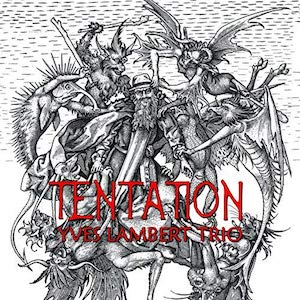 Yves Lambert Trio – Tentation
Yves Lambert Trio – Tentation
La Prûche Libre – Out Now
The history of Quebec is one of a unique blend of cultures, and as a result, the area’s music has a singular and special appeal. The nineteenth century saw an influx of Irish immigrants to the area, and these combined with the Scottish roots of Quebec’s neighbouring Maritime provinces and the more obvious Breton and northern French traditions to create a musical heritage with a distinctly Celtic flavour and a strong, independent spirit.
Yves Lambert and his trio carry the flag for contemporary Quebecois folk. Lambert himself has been active for something in the region of forty years, both as a solo artist and a member of La Bottine Souriante, and is considered something of a cultural phenomenon in his homeland. He is an accordion player of great skill and a sympathetic interpreter and arranger of an often surprising treasure trove of traditional music. He is joined on Tentation by violinist Tommy Gauthier and guitarist Olivier Rondeau, and together they kick up a merry racket of rambunctious, often rock-oriented songs.
Opener La Poule a Jean-Paul is a case in point, Rondeau’s forceful guitar and Lambert’s not-to-be-messed-with singing carrying the song forward at quite a pace, punctuated a couple of times by the virtuosic blasts of Gauthier’s fiddle. Ignominie pairs sprightly guitars with earthy vocals. To non-Francophone ears, the effect is somewhere between the brisk immediacy of Carthy-era Steeleye Span and the contemporary quirks of Bellowhead, but there is a unity in the playing, a skilful pragmatism that, along with the varied cultural reference points, makes it both reassuringly homely and difficult to pin down. Cousinage et penchant pour Ti-Jean, with its swift and satisfying vocal horseplay, is not quite like anything in the British folk canon.
Tentation contains a smattering of accomplished instrumental tracks. Suite Du Cap Breton et La Déboulade is a particularly good showcase of the versatility of all three musicians, its quick interchange of melodies is handled with subtle panache. Vent d’Irlande shows the group’s sensitive side (and Celtic influences), with a delicately fingerpicked guitar intro that leads into a fluid dance tune.
The trio are also capable of building dramatic musical narratives from the minimum of ingredients: Les Diables is a gleeful tumble of verses leading to a chorus of off-kilter wordless vocals, and eventually fading out in a twisted squall of fiddle. Le Lac Rond is equally effective, albeit in an entirely different way: Lambert’s vocals are accompanied solely by a harmonium drone provided by guest instrumentalist Marc Busic. It is hearty fare, and it may be tempting to describe it as the musical equivalent of a potent but rustic wine, but that would be to unfairly ignore its many subtleties.
Tentation is given a rousing send-off thanks to VIP Pour l’Enfer, where the joyous instrumental melodies that characterise the whole album combine with some high-energy ensemble singing. And that apparently easy combination of disparate elements is what makes Lambert and his trio so special. For listeners unacquainted with Quebecois folk music they have created an eloquent document of a musical form that is very much alive, but just as importantly they have put down a feisty, foot-stomping collection of unusual and highly rewarding tunes.
Photo courtesy of Artist
